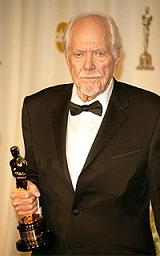 Hollywood lost a cinematic legacy yesterday when the director of the such critically acclaimed movies as “M*A*S*H” and “Nashville,” Robert Altman, passed away at the age of 81. For decades, Altman set himself apart from other directors by developing a non-linear form of storytelling and by often using long sequences of overlapping dialogue among his characters. It’s a style of filmmaking that many younger directors copy today, but back in the 1970s was anything anything but typical.
Hollywood lost a cinematic legacy yesterday when the director of the such critically acclaimed movies as “M*A*S*H” and “Nashville,” Robert Altman, passed away at the age of 81. For decades, Altman set himself apart from other directors by developing a non-linear form of storytelling and by often using long sequences of overlapping dialogue among his characters. It’s a style of filmmaking that many younger directors copy today, but back in the 1970s was anything anything but typical.
Though Altman never experienced huge commerical success, and was not even recognized by the film industry with an Oscar until earlier this year, Altman has left behind a body of work that examines the best and worst of all segments of society. And while I never cared for his abrasive political and personal rantings, Altman successfully achieved what all revolutonary artists attempt to do: He shaped our culture and redefined an art form by insightfully questioning the conventions of society (“Gosford Park” ), religion (“A Praire Home Companion“), corporate America (“The Player”), and politics (‘The Caine Mutiny Court-Martial”) with a point-of-view that was unique, and for better or worse, steadfastly uncompromised in its worldview.
For me, the Altman films that I liked best where the ones that celebrated the creative process. These films–which include “The Company” and “Vincent and Theo”–are not considered his very best, but I think they reveal the true passion he had for beauty of art in it’s purest form to communicate truth.
And if you’d like to read what other film critics have to say about Altman’s life and work, I encourage you to go here and here.


